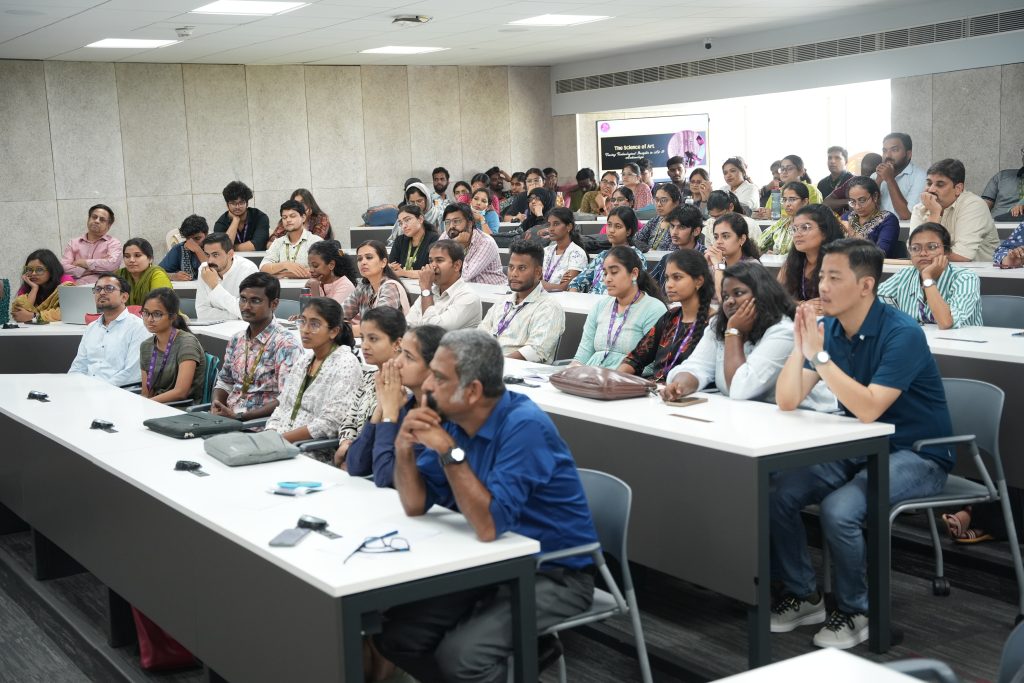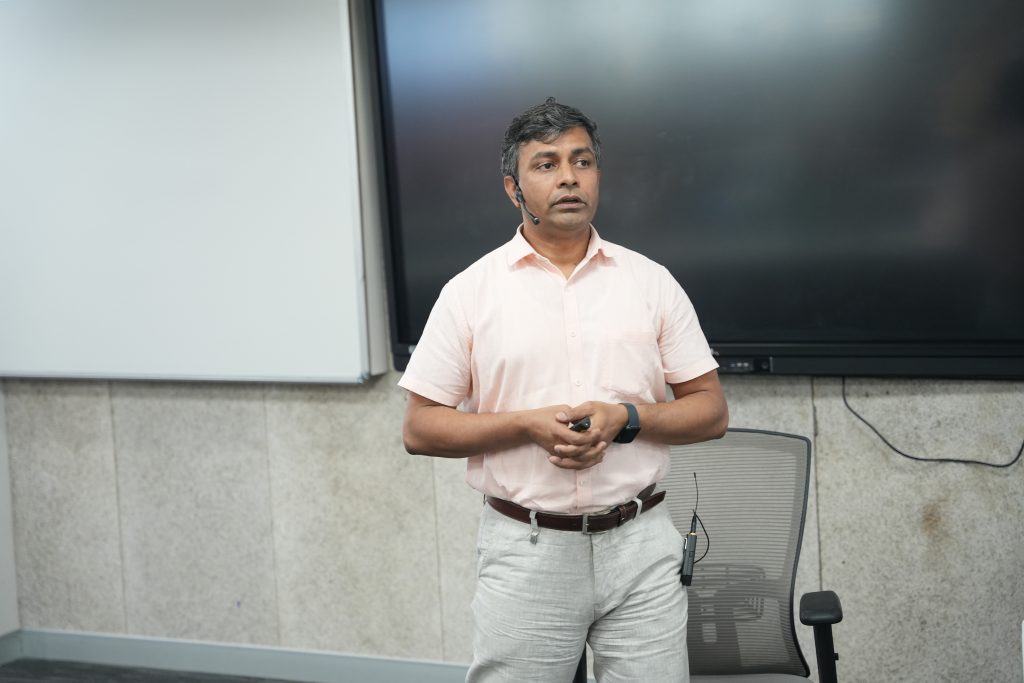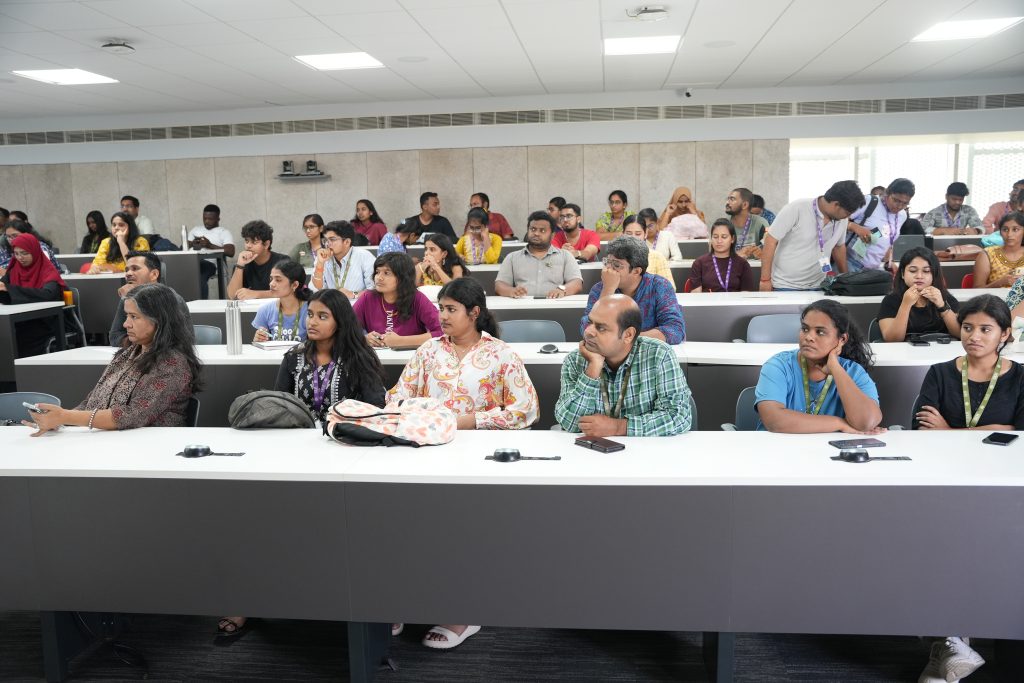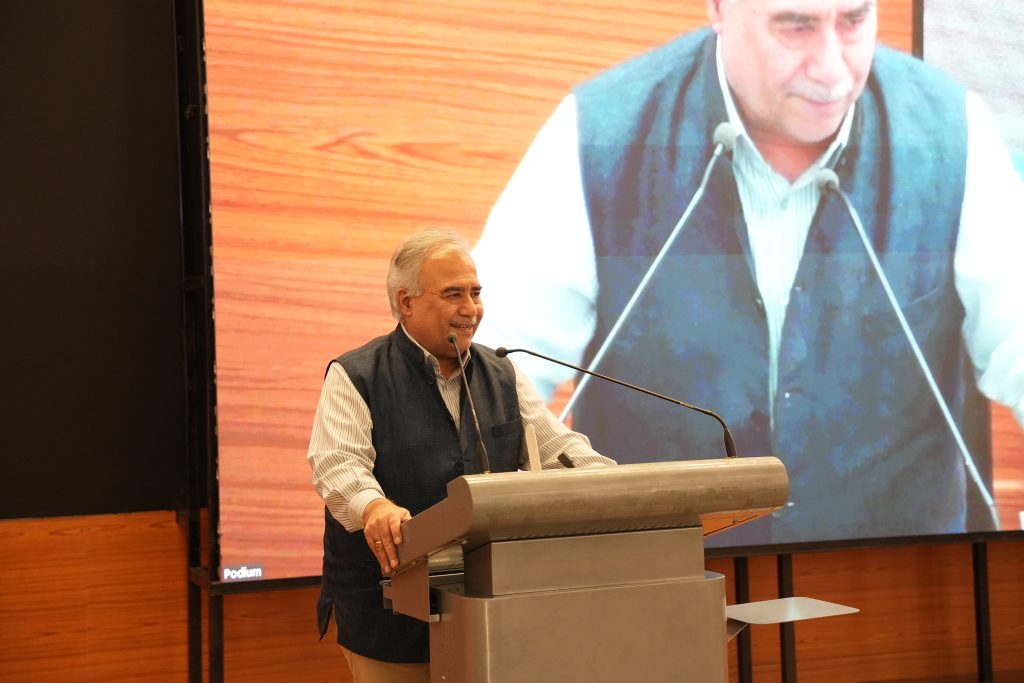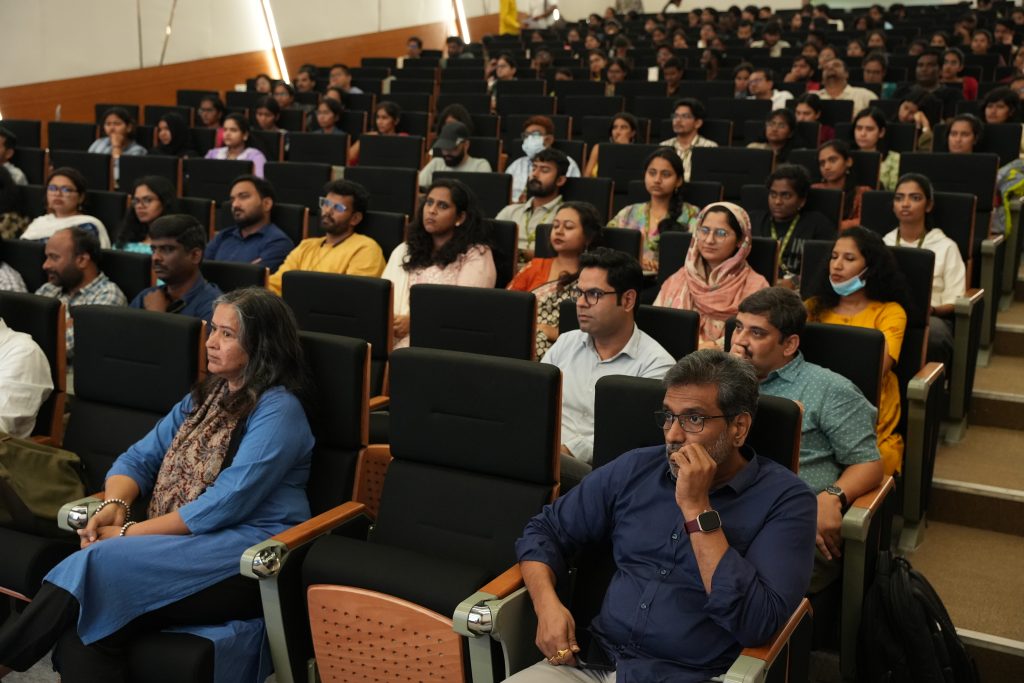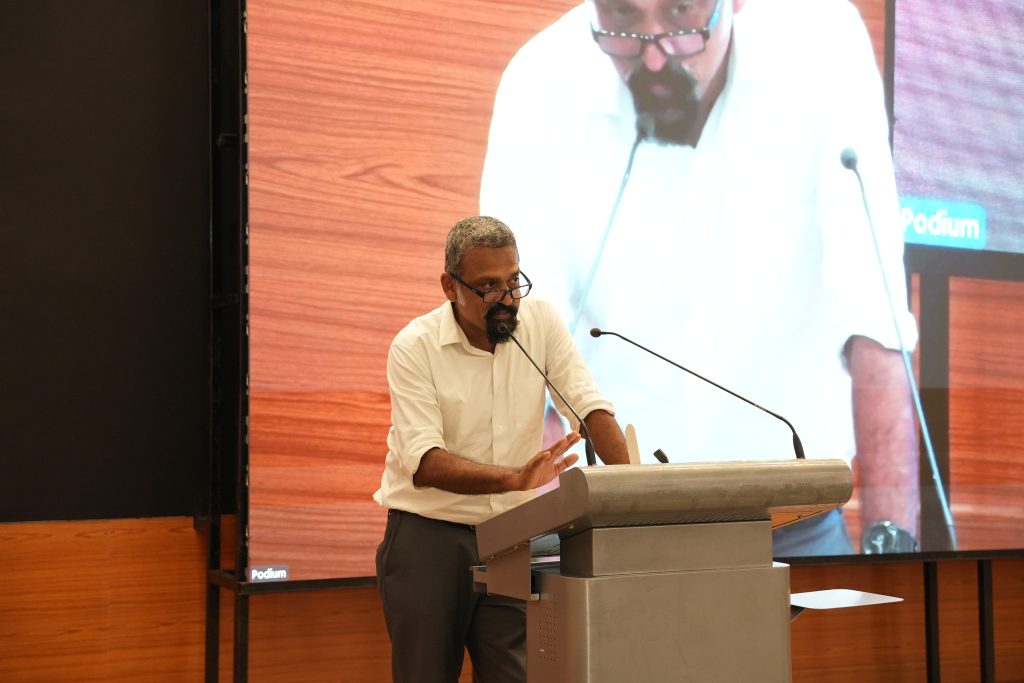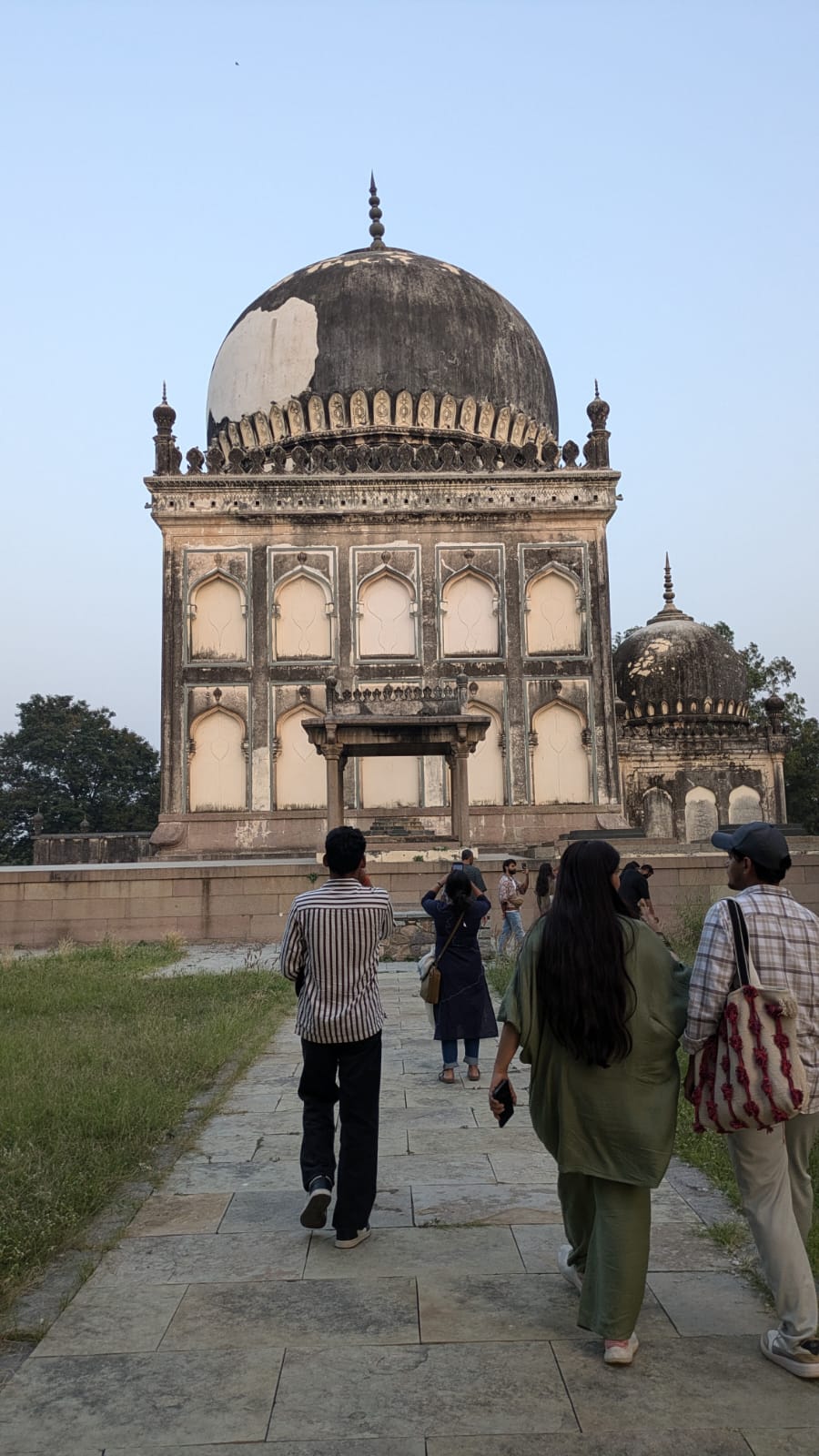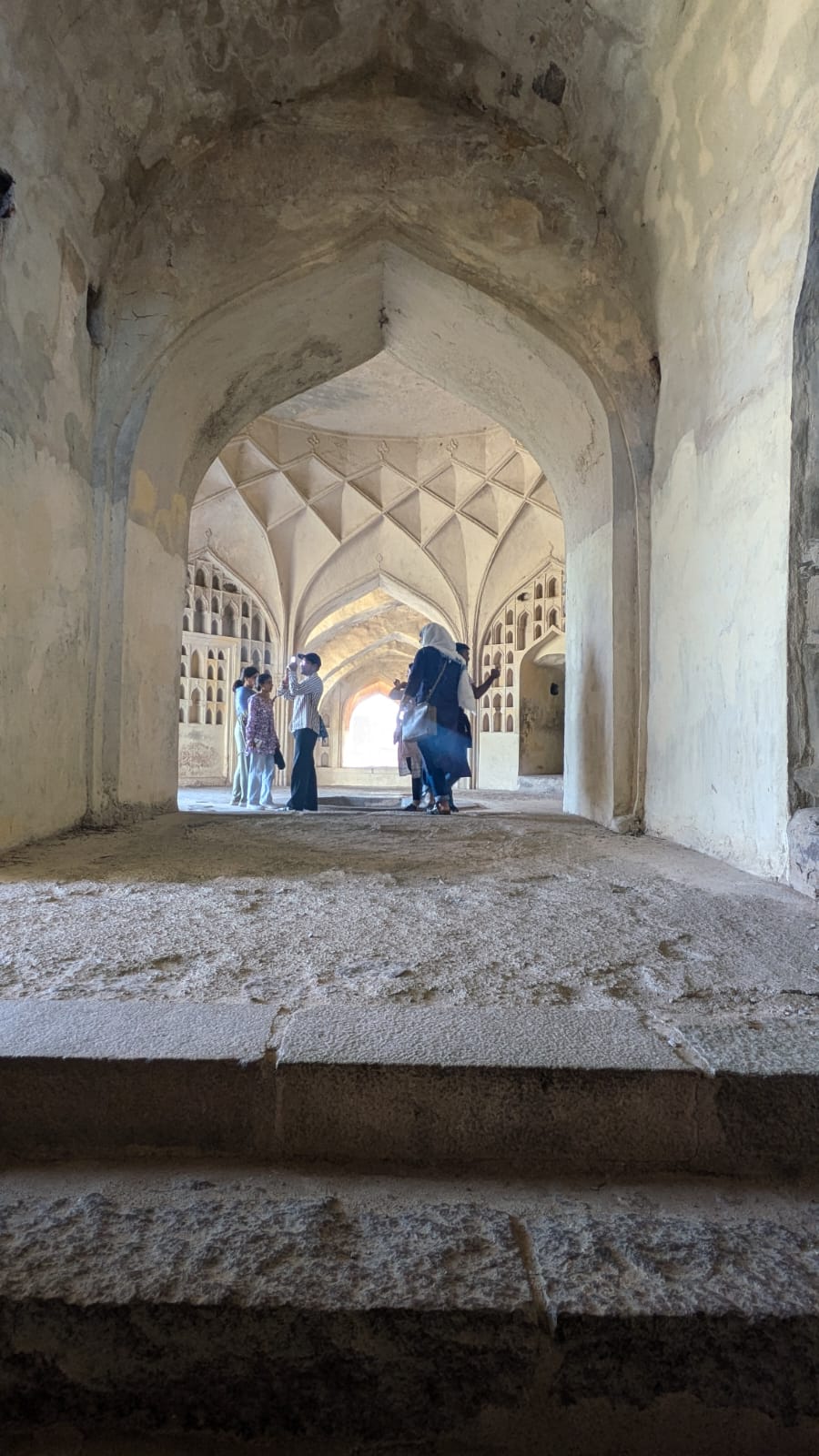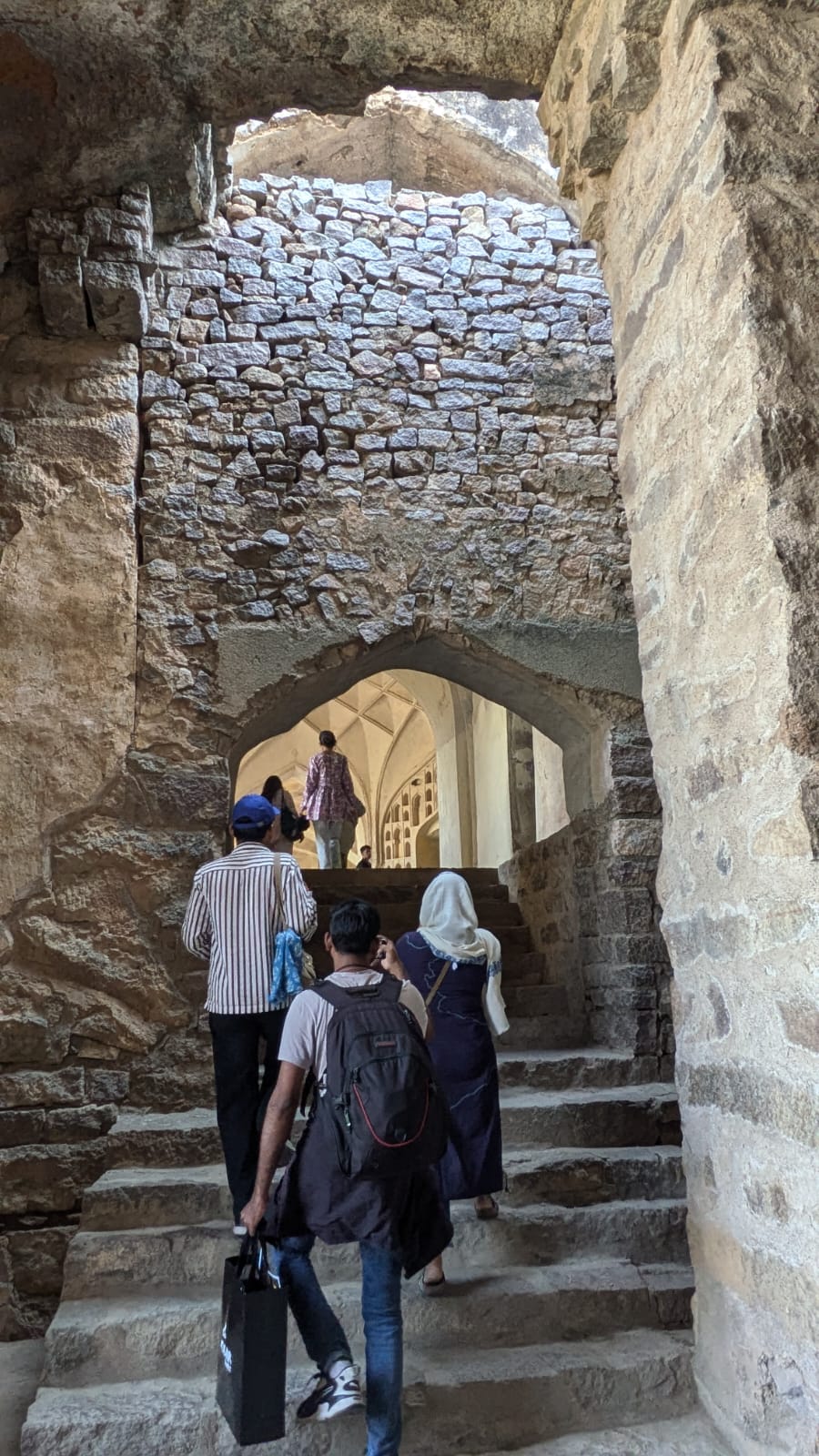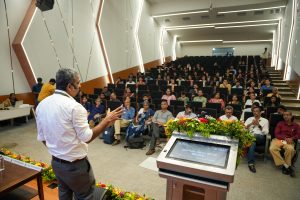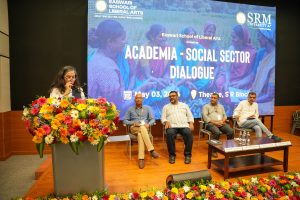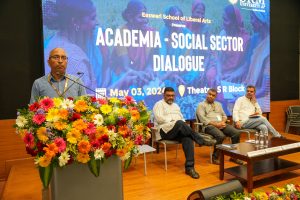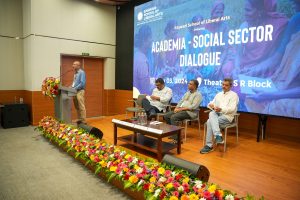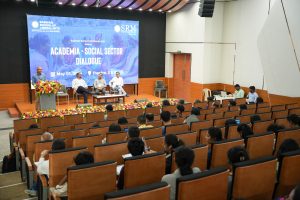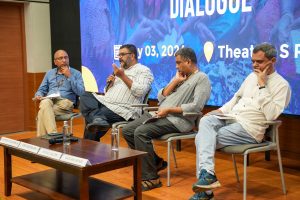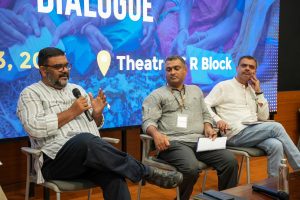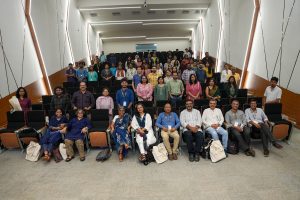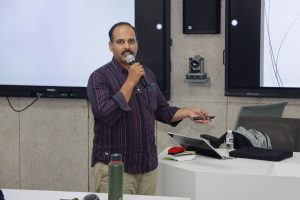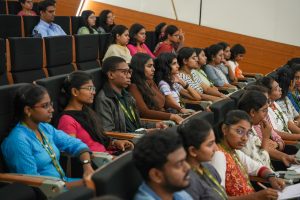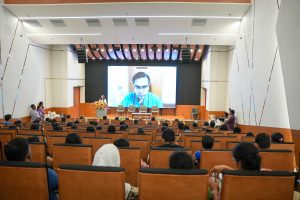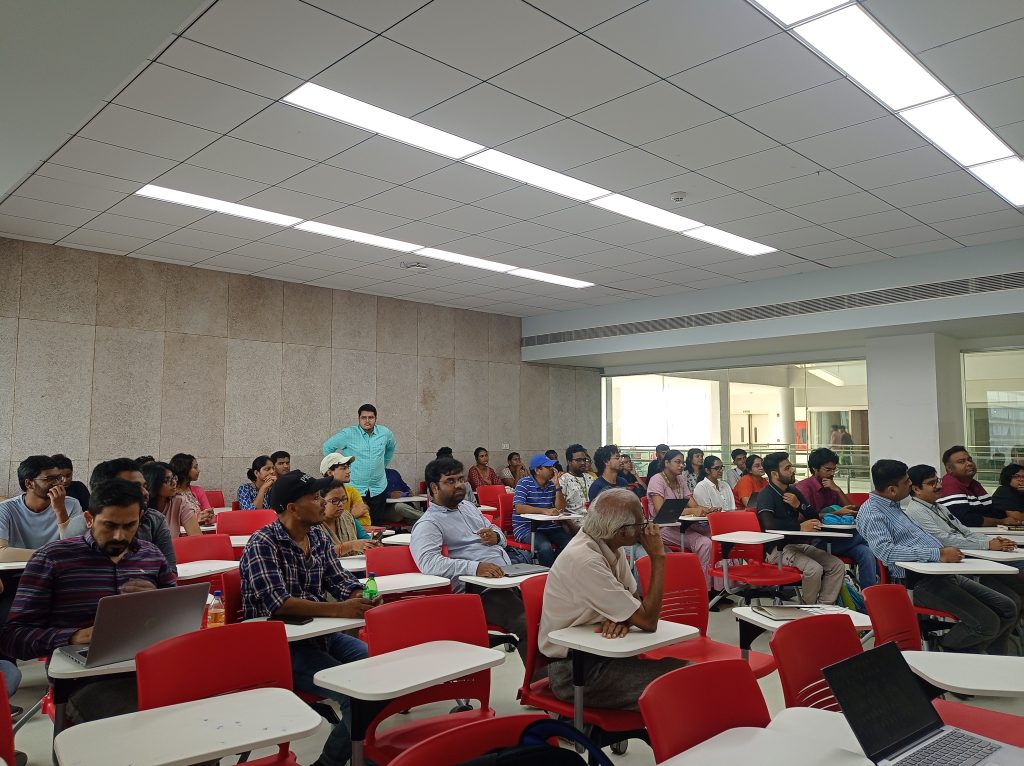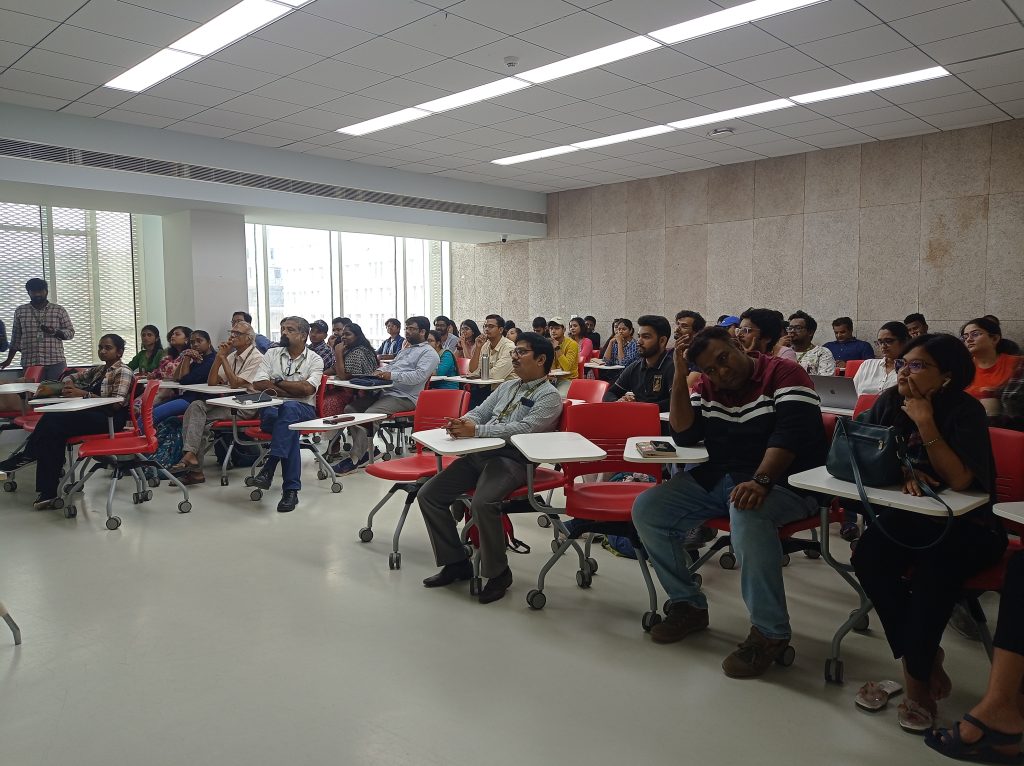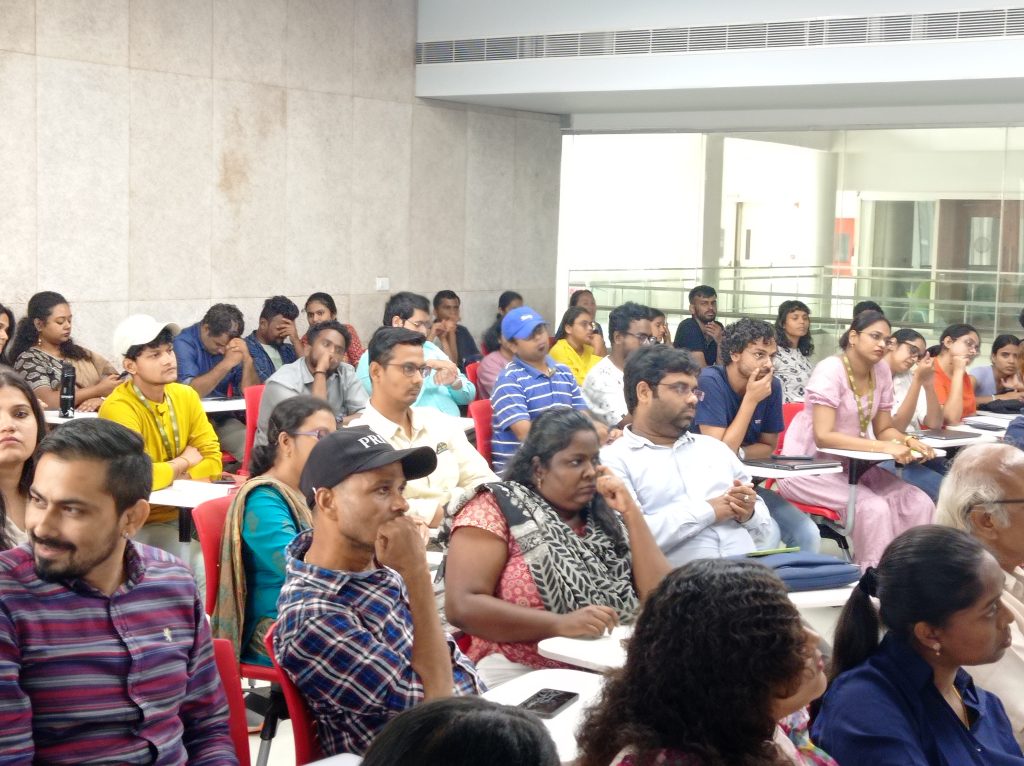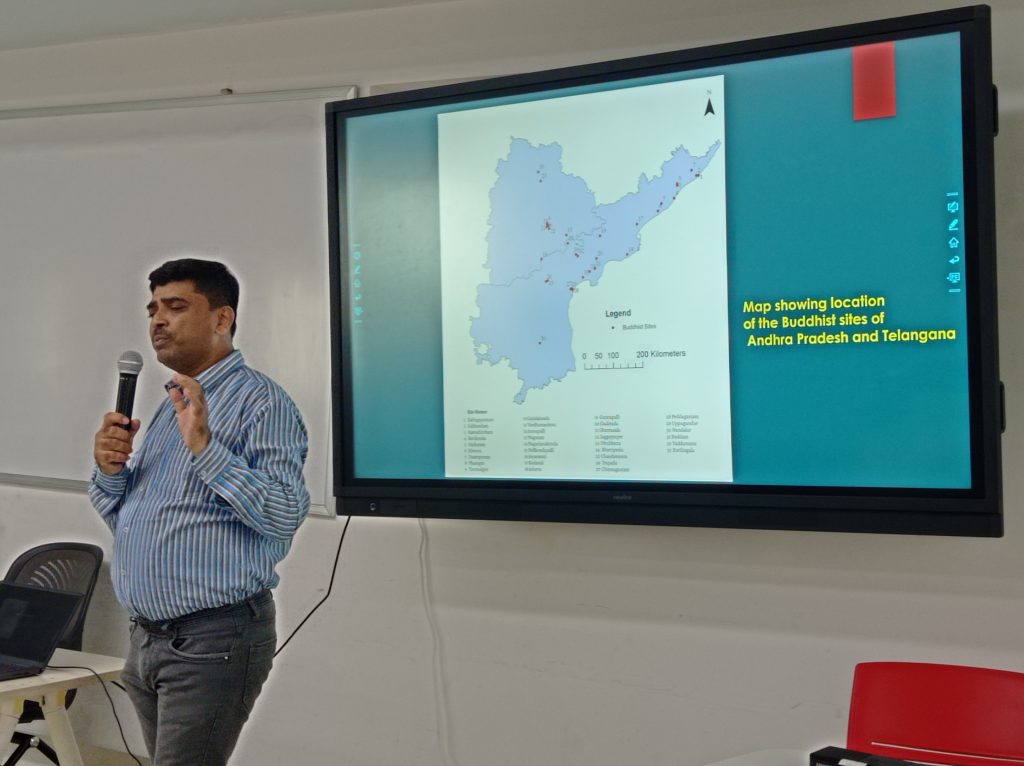An Introspection into the Science of Art and Archaeology
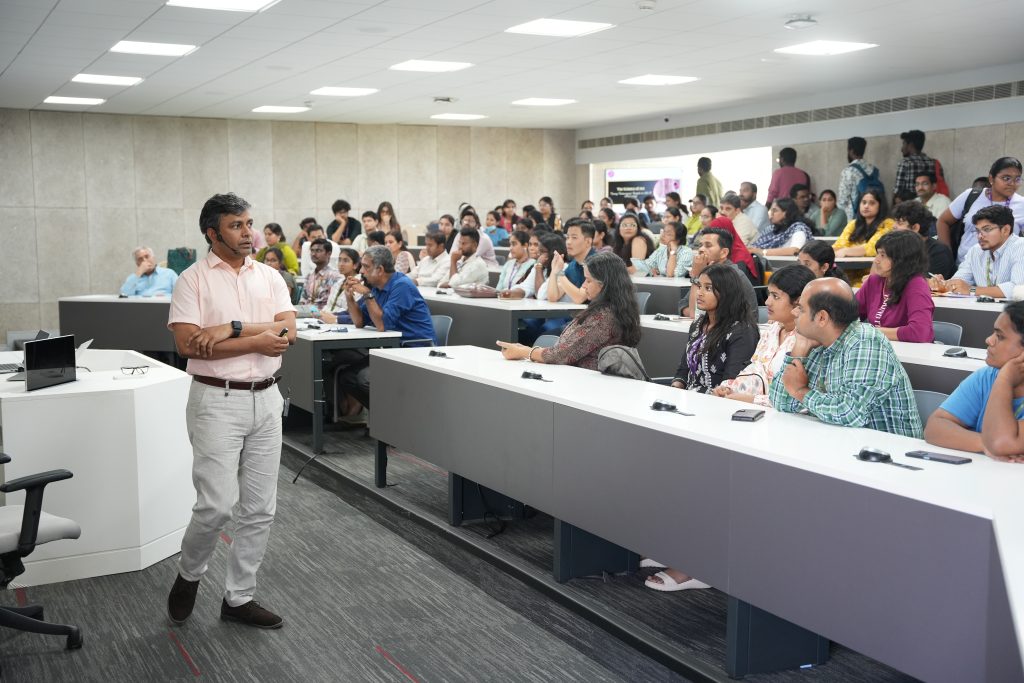
The Department of History, Easwari School of Liberal Arts, hosted Prof. Satish C. Pandey, Dean of Academic Affairs, Professor & Head—Department of Art Conservation, Indian Institute of Heritage, Ministry of Culture, Government of India, and Vice Chair—Directory Board, International Council of Museums—Conservation Committee (ICOM-CC), ICOM, Paris, France, for an insightful lecture on tracing technologies in art and archaeology on April 03, 2025.
In his session, Prof. Pandey shared his expertise in art conservation and archaeological science, offering valuable insights into the study of provenance and technology. He discussed the Site of Kunal from the Harappan Period and the intricate analysis of ancient pottery. His research highlighted the natural techniques used in pottery-making, where shape, colour, and firing methods were influenced by organic materials. Elements such as manganese (black), iron (red), and lime (pure white) were used to create distinct hues, while the lightweight nature of the pots was a result of their composition.
In addition to pottery, Prof. Pandey delved into the conservation of historical paintings. His research has uncovered instances of forgery and modification in artworks intended for public display. By utilising infrared analysis, he demonstrated how changes in oil paints, cracking patterns, and colour modifications over time help researchers restore and authenticate original paintings.
His visit provided an enriching experience, deepening our understanding of conservation science and its role in preserving cultural heritage.
- Published in Departmental News, History Current Happenings, History News, News
National Symposium on Rethinking Gandhi in Contemporary Times
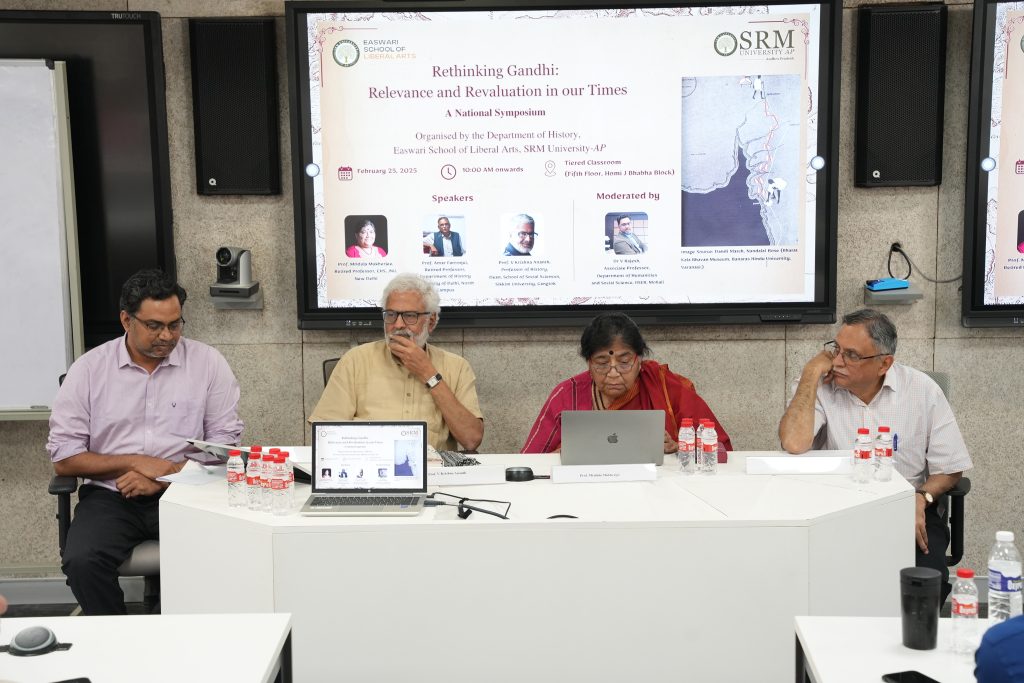
The Department of History from the Easwari School of Liberal Arts, hosted a national symposium on “Rethinking Gandhi: Relevance and Revaluation in our Times,” focusing on the facets of Gandhian legacy of meditation and tolerance. The symposium, held on February 25, 2025, witnessed an assembly of noted stalwarts of Gandhian Studies and modern South Asian history whose expertise in unpacking Gandhi and his politics is noteworthy. Prof. Mridula Mukherjee, Retired professor, JNU, Prof. Amar Farooqui, Retired professor, University of Delhi-North Campus, Prof. V Krishna Ananth, Professor of History, Dean of the School of Social Sciences, Sikkim University, Gangtok, delivered insightful sessions at the symposium moderated by Dr V Rajesh, Associate Professor, Department of Humanities and Social Science, IISER, Mohali.
Prof. Vishnupad, Dean of Easwari School of Liberal Arts, gave a comprehensive account of the relevance of revisiting the Gandhian legacy and ideology of inclusivity, compromise and tolerance in the contemporary world. He also opined the importance of liberal arts education in redefining oneself and shaping young minds into leaders and change-makers of tomorrow.
The symposium highlighted three perceptive lectures by leading academicians in Gandhian Studies. Prof. Mridula Mukherjee elucidated Gandhi as a leader of civil liberties. She commented, “Gandi’s doctrine placed democracy, civil liberties, and the notion of dissent in the forefront. His political ideology played with the terrains of legality and legitimacy.” Prof. Amar Farooqui discussed Gandhi’s relevance, particularly in relation to the idea of secularism. He commented, “Gandhi is uncompromisingly secular” and emphasised that Gandhi’s understanding of secularism remains relevant today.
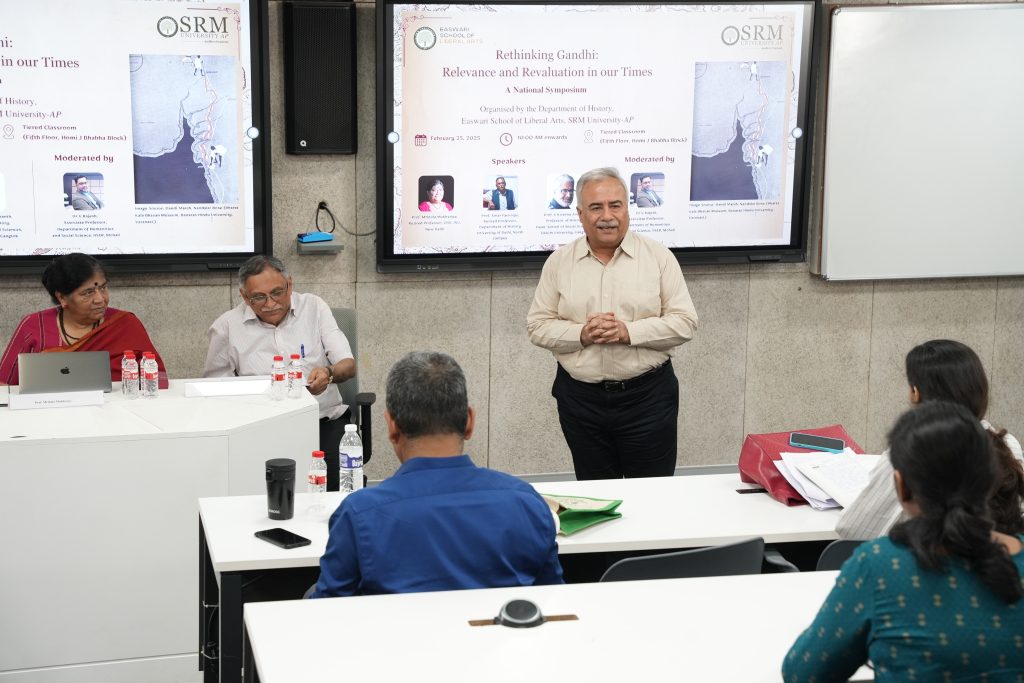
Prof. V Krishna Ananth highlighted that tolerance was central to Gandhi’s journey. He remarked that Gaandhi’s activism exposed the exploitative nexus between colonialism and financial power, a reality that remains relevant today. Dr V Rajesh moderated a Q&A session following the lectures.
Vice Chancellor Prof. Manoj K Arora expressed his appreciation to the Department of History and the Easwari School of Liberal Arts for this formidable initiative. He stated, “The National symposium is hugely beneficial for liberal arts students to enlighten the idea of swaraj. It is important for young minds to imbibe Gandhi’s teachings to strive towards a right and judicious world”.
The symposium aimed at revisiting Gandhi’s legacy, ideology, and vision and their relevance in the contemporary world. The event featured the participation of the Associate Dean of Easwari School of Liberal Arts, Prof. Vandana Swami, Head-Department of History Dr Aqsa Agha, Convenor of the symposium, Dr Maanvender Singh, faculty from the Liberal Arts school, research scholars, and students.
- Published in Departmental News, History Current Happenings, News, Research News
Padmashri Prof. Shanti Sinha Discuss Child Labour and Child Rights in India at UDL#20
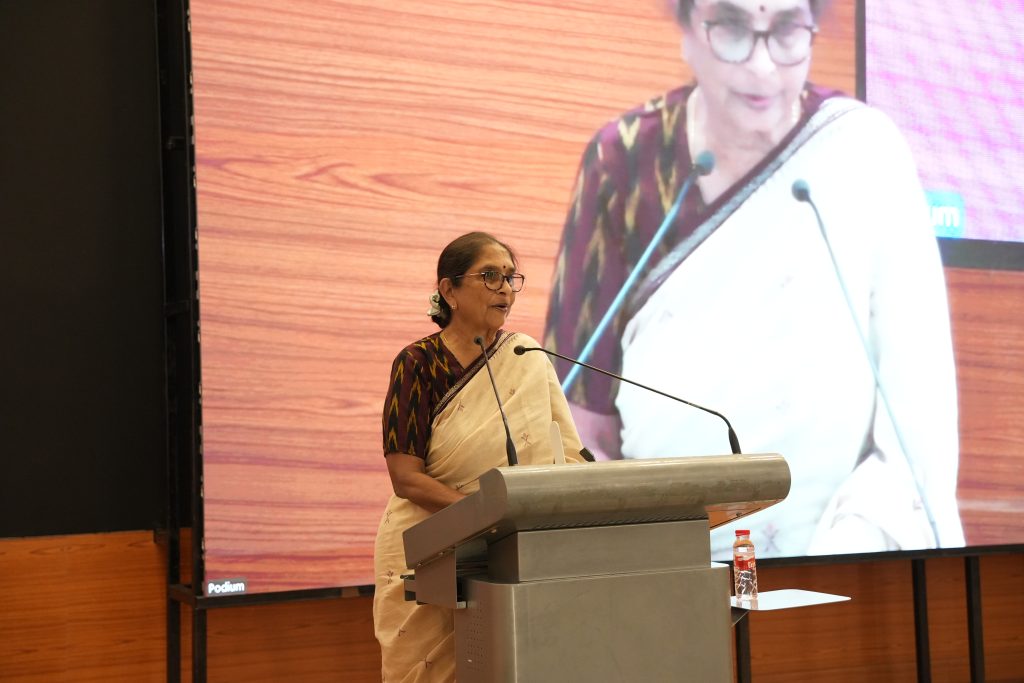
“Every Child Out of School is in Child Labour. Education, Education and Education alone is the Way Forward for a Progressing India.” – Prof. Shanti Sinha
The twentieth edition of the University Distinguished Lecture (UDL) on February 21, 2025, witnessed an invigorating session by the eminent anti-child labour activist Padma Shri Prof. Shanta Sinha, Ramon Magsaysay Awardee, Former Chairperson of the National Commission for Protection of Child Rights (NCPCR), and Professor (Retd.) Dept. of Political Science, Hyderabad Central University. The session on the topic “Making Education a Reality and Ending Child Labour: Experience of M.V. Foundation” gave an overview of the work of M.V. Foundation in the field of child rights in India.
In a society ravaged by poverty, where children were forced to join the bonded labour workforce, Prof. Sinha remarked that it was not poverty that led to child labour but child labour that led to poverty. Prof. Sinha elucidated on the non-negotiable principle adopted by the M.V. Foundation, that ‘no child must work, and every child must attend full-time formal day school,’ which broke the societal norms of Indian society.
She briefly spoke about the impact that the M.V. Foundation had and the ripple it created in the field of child rights. “M.V. Foundation has withdrawn over 15 lakh children in the age group of 5-14 years from child labour; stopped over 20,000 child marriages and pioneered a program for mainstreaming children to schools through residential bridge courses. The MVF’s mission to abolish child labour also led to the Closure of Night Schools and the creation of necessary amendments in the Child Labour Act of 1986,” stated Prof. Sinha.
The session also discussed Prof. Sinha’s Journey at the National Commission for Protection of Child Rights (NCPCR), and the various challenges faced in addressing key issues such as violation of children’s rights in relation to child labour and child trafficking, rights of children in areas of civil unrest, juvenile justice system, corporal punishment, child abuse and violence on children, and child malnutrition.
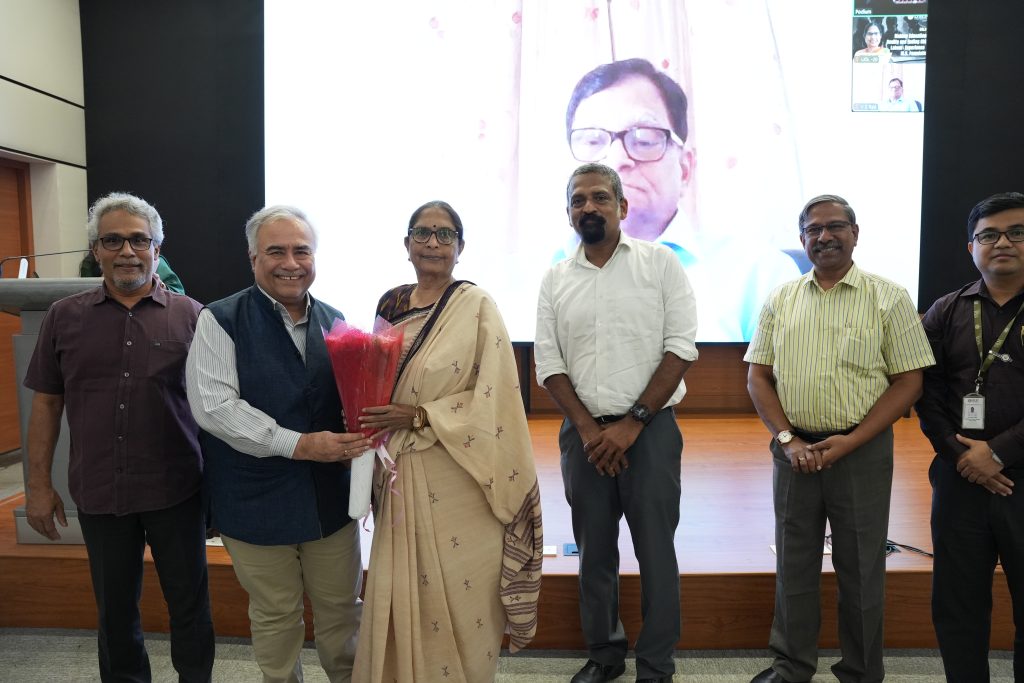
The UDL 20 was a mind opener and a lens into the reality of child labour still prevalent in India. Prof. Manoj K Arora, Vice Chancellor of SRM University-AP, expressed his gratitude to have the presence of a torchbearer of social reform at the UDL. He stated, “Prof. Sinha is a stalwart whose work has created a magnitudinal shift in the societal norm, significantly contributing to the abolition of child labour in India. We are grateful to imbibe from her knowledge and experience as a social leader.” Dean of Easwari School of Liberal Arts, Prof. Vishnupad, also expressed his heartfelt appreciation for Prof. Sinha’s presence and her work. He stated that the thought-provoking and inspiring session will ignite students to think in a ‘non-conventional’ way and offer courage to make a change.
The 20th UDL was organised under the aegis of the Office of Dean-Research, the UDL committee, and the Easwari School of Liberal Arts. It witnessed the presence of Registrar Dr R Premkumar, Dean of the School of Engineering and Sciences, Prof C V Tomy, Dean of Research, Prof. Ranjit Thapa, and Faculty and students of the varsity. The signature lecture series is the university’s flagship initiative to impart global exposure and quality education to its students.
Field Trip to Hyderabad: A Journey of Education, Culture, and Adventure
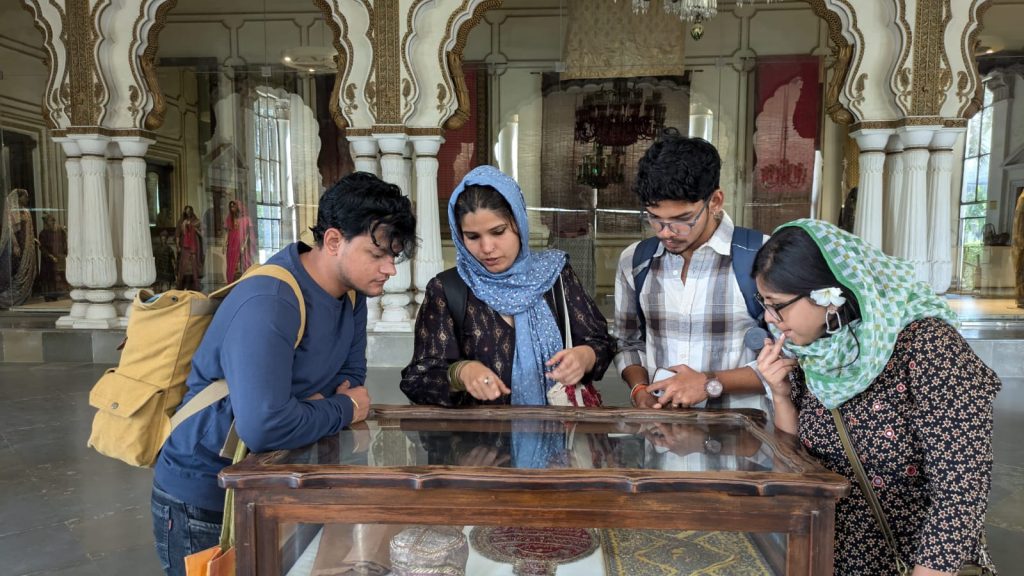
The 5th Semester B.A. History students went on a field trip to Hyderabad as part of their courses ‘Medieval India’ and the ‘Eighteenth Century in Indian History’. Dr Aqsa Agha, Course Coordinator, and Dr Manaswini Sen led the study group to explore the city’s historical and cultural significance, enhancing their learning outside the classroom for the two courses.
The group visited Charminar, exploring the iconic monument and its surrounding bazaars, Golconda Fort, discussing its history and architecture with a Heritage Walk Practitioner from Hyderabad, and finally the Qutb Shahi Tombs and gardens, a standing testament of Indo-Persian architectural excellence.
The field trip provided students with a refined exposure to the diverse culture and history of Hyderabad and the historical context of the evolution of the culture of the city. The students had a wonderful chance to visit the important historical monuments and urban morphology that mark the period of study in the courses on Medieval and Eighteenth-century Indian History.
The field trip fostered a deep understanding of the respective courses, inspiring students to explore beyond books and classrooms.
- Published in Departmental News, History Current Happenings, History News, News
Tracing Feminist Discourse in the Intellectual Output of Women Trade Unionists in Late Colonial Bengal
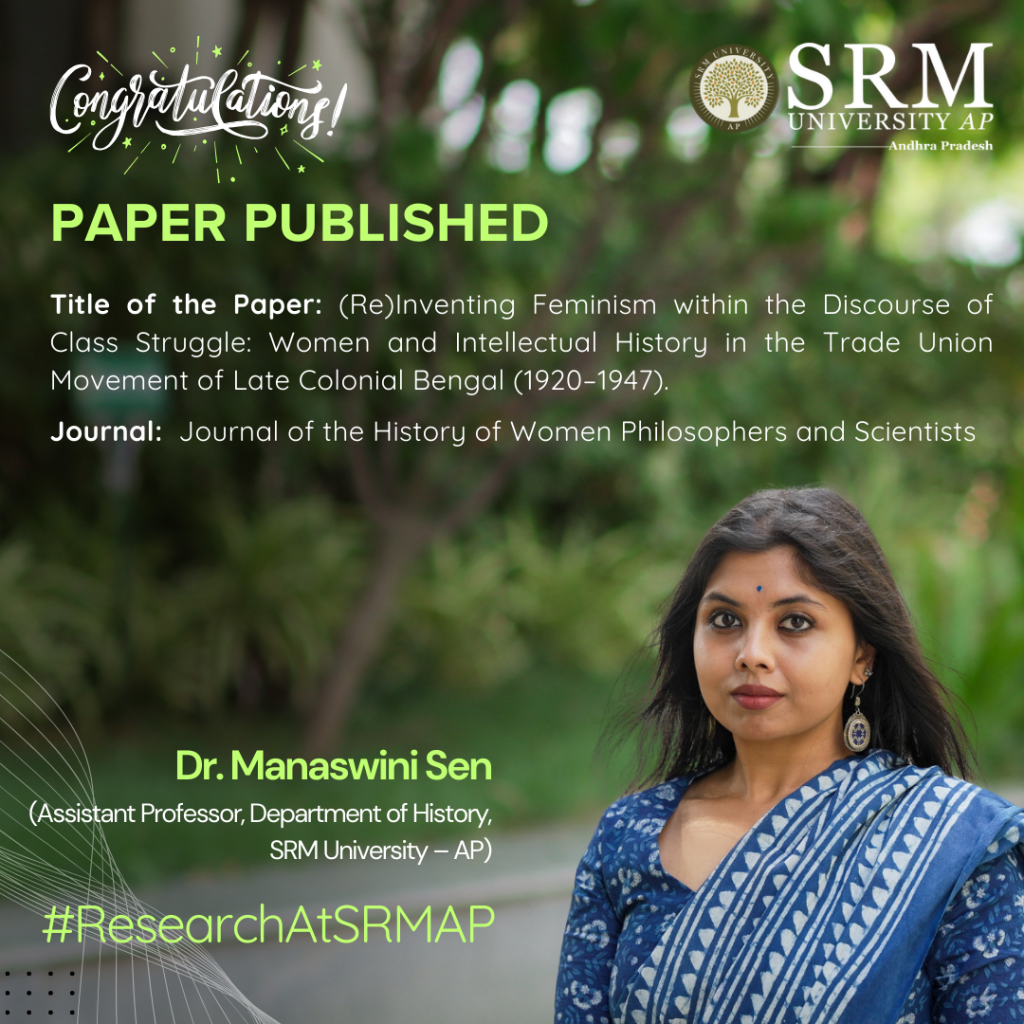
Dr Manaswini Sen, Assistant Professor at the Department of History, has published an insightful paper tracing the ideological and intellectual output of women trade unionists in late colonial Bengal. Her research paper titled “(Re)Inventing Feminism within the Discourse of Class Struggle: Women and Intellectual History in the Trade Union Movement of Late Colonial Bengal (1920–1947)”, published in the prestigious Journal of the History of Women Philosophers and Scientists, offers a novel perspective on understanding the class struggle, anticolonial discourse in the patriarchal society of colonial Bengal.
Abstract
This paper envisages (re)constructing the intellectual praxis of women trade unionists in late colonial Bengal. By arguing how political practice habitually translates to political thought, the paper devises a methodology to address the gendered discourse of intellectual history in the Global South. It focuses on intellectual output, primarily journal articles of women trade unionists like Santoshi Kumari Gupta, Maitreyee Bose, and Kanak Mukherjee, to trace a genealogy of how class struggle was perceived by women labour activists across the ideological spectrum of nationalism, socialism, and communism between 1920 to 1947 in Bengal. The piece is an effort to transcend the manifold marginalisations that plague the establishment of feminine political praxis within the regulating structures of colonialism and capitalism. In the process, it bids to unfold an alternative narrative of the anti-colonial, anti-capitalist, and anti-patriarchal narrative of the decolonisation of South Asian intellectual thought.
Research, Collaboration and Future Research Plans
The research strives to bring to the forefront the intellectual contributions of three female trade unionists in the late colonial period to trace the evolution of discourses on anticolonial class struggle from a gendered perspective. With the global turn in intellectual history, there is an augmented effort at amplifying the ‘small voices of history’. The inherent socio-cultural predicaments in our society make it inordinately challenging to trace conventional sources for mapping the intellectual endeavours of women. This paper aims to rectify this gap by reconstructing women labour activists’ intellectual practises and literary output in the early 20th century. In the process, the research tries to bring forth narratives of anticolonialism, which drowns in the overwhelming presence of nationalism in the discourses of decolonisation of South Asia. This paper was the result of academic exchanges with professors of Benaras Hindu University, Dr B.R. Ambedkar University, Delhi, and the University of Paderborn, Germany.
Dr Sen primarily researches marginal anticolonial epistemological traditions of South and South East Asia. Her thesis on the evolution and dissemination of socialism in late colonial Bengal, which focuses on an intellectual history of trade unionism, forms the basis of her first monograph. However, she is now focusing on the transnational and transcontinental intellectual networks of a wide spectrum of leftist labour activists and proto-nationalists and the ways these fringe intellectual traditions interacted with each other and nationalism. Based on a rich archive across India and Europe and a plethora of alternative sources, she tends to devise new methodological interventions in the field of Global Intellectual History, making labour history more accessible and relevant in scholarly circles.
- Published in Departmental News, History Current Happenings, History News, News, Research News
Easwari School of Liberal Arts Facilitates Transformative Academia-Social Sector Dialogue
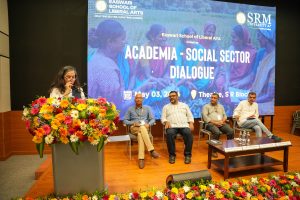 The Easwari School of Liberal Arts hosted the highly anticipated “Academia-Social Sector Dialogue” event, aiming to foster collaboration between academia and the social sector. The event brought together experts, social actors, scholars, practitioners, and students to engage in insightful discussions about the intersection of education and social sector development.
The Easwari School of Liberal Arts hosted the highly anticipated “Academia-Social Sector Dialogue” event, aiming to foster collaboration between academia and the social sector. The event brought together experts, social actors, scholars, practitioners, and students to engage in insightful discussions about the intersection of education and social sector development.
The event, convened by Prof. Vandana Swami, brought together a distinguished array of social sector leaders, Academicians from various states across India, deans, faculties, and students. It was a day of enlightening discussions and knowledge exchange, aiming to bridge the gap between academia and the social sector.
At the heart of this dialogue was a commitment to nurturing well-rounded, socially conscious leaders of tomorrow. The event provided a platform for students to engage directly with eminent figures from the social sector, fostering a deeper understanding of real-world challenges and opportunities.
The dialogue saw participation from leading social actors, including Liby Johnson (Gram Vikas, Odisha), Ronak Shah (Seva Mandir, Udaipur), Nishant Aggarwal (Donyi Polo Cultural and Charitable Trust, Arunachal Pradesh), Swapna Sarangi (Foundation for Ecological Security, Odisha), Gayatri Menon (Independent Researcher, Public Health Foundation of India, Bengaluru and Academic luminaries, such as Suraj Jacob (Azim Premji University, Bengaluru) and Manu Mathai (World Resources Institute, Bengaluru) Yamini Aiyar, Former President, Center for Policy Research, New Delhi, added depth to the dialogue, offering nuanced perspectives on the intersection of academia and the social sector.
Prof. Vishnupad, Dean of Easwari School of Liberal Arts, expressed his satisfaction with the event’s outcomes, stating, “We are delighted to have facilitated this enriching exchange between academia and the social sector. The discussions were not only insightful but also generative, paving the way for potential future collaborations between students and social sector organisations that can bring about positive change in the society.”
A highlight of the event was the keynote speech by Amitabh Behar, Global Executive Director of OXFAM. Behar’s insights sparked discussions among attendees, leading to reflection and action-oriented dialogue on caste, gender, and economic inequality. This prompted introspection and dialogue on the responsibilities of civil society in addressing these urgent issues.
The event featured thought-provoking panel discussions on two key themes: “Social Sector and the Indian State: Challenges and Opportunities” and “Role of Social Sector in Liberal Arts Education.” Panellists deliberated on the complexities and possibilities within the social sector, exploring ways to address challenges and leverage opportunities for societal progress. The dialogue was not only engaging but also fruitful, laying the groundwork for potential collaborative efforts in the future.
Furthermore, discussions on the Easwari School of Liberal Arts Summer Immersion Programme underscored the institution’s commitment to experiential learning and social impact.
Prof. Vandana Swami, Professor, Easwari School of Liberal Arts remarked, “Academia-Social Sector Dialogue epitomises SRM University-AP’s ethos of excellence, innovation, and social responsibility. It serves as a testament to the university’s unwavering dedication to shaping future leaders who are not only academically proficient but also socially conscious and empathetic global citizens”.
- Published in Departmental News, History Current Happenings, Liberal Arts News, Media Studies, News
Research Fellowship from Humboldt University of Berlin
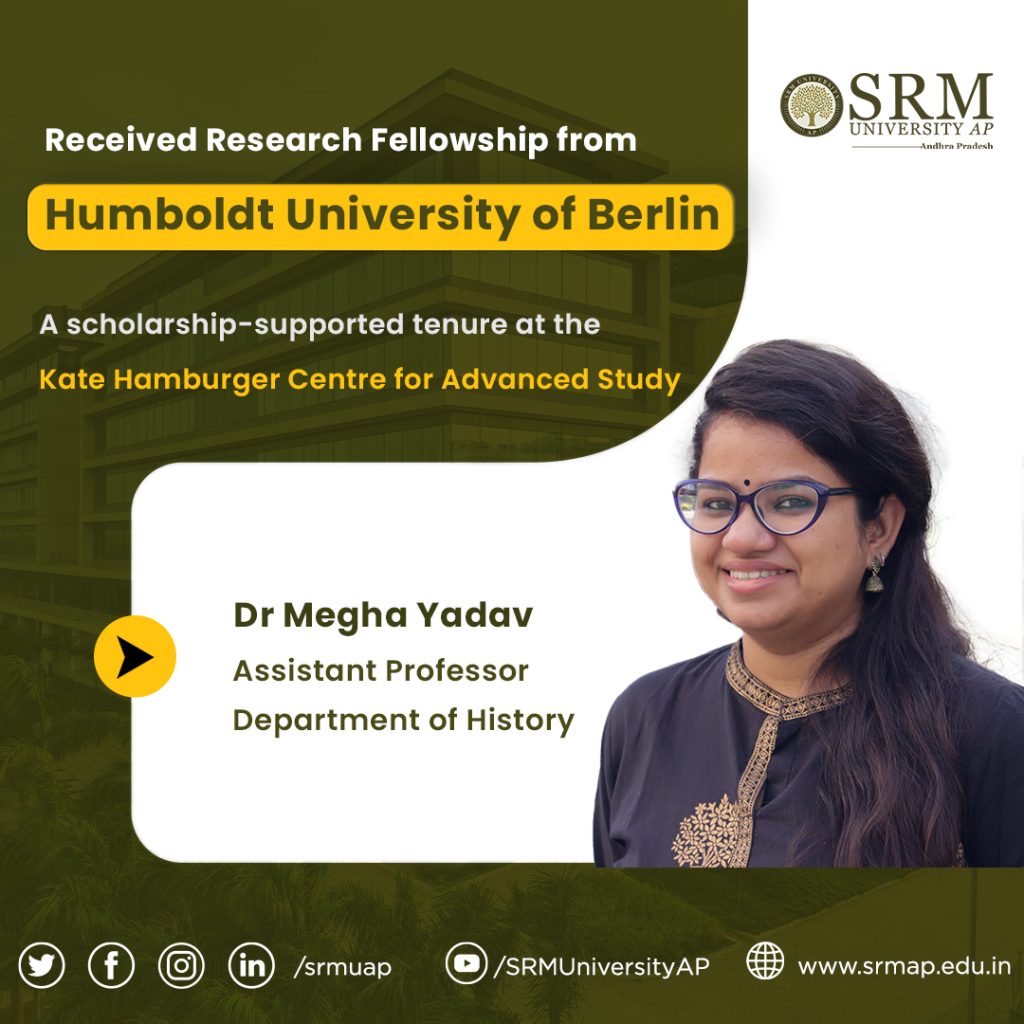
Dr Megha Yadav has received a prestigious fellowship from the Käte Hamburger Centre for Advanced Study, inherit.Heritage in Transformation, Humboldt Universität Zu Berlin, Germany. The fellowship allows for the undertaking of the research project, Visualising the Tradition, Preserving History: Material Practices in Tibetan Buddhism. This project takes an initiative to understand the ideas of heritage and history among the Tibetan Buddhist community by looking at the visual material and its heritage in Tibetan society to reach a nuanced picture of Tibetan history and heritage which keeps the Tibetan community at the centre of this understanding.
The project will attempt to understand the ways and methods of remembrance, preservation, and transmission of what Tibetan Buddhists consider to be their history. Most academic works have utilized Buddhist textual traditions to talk about Tibetan society, which has the inherent limitation of being one-dimensional. As a point of entry, this research will focus on thangka paintings as they create a very intimate window to people’s way of thinking about themselves, their universes, and their personal history. It was a ‘material’ to be showcased in public spaces, notably monasteries. It was meant for everyone to see, pay their respects, and take the image back with them in their minds and hearts. In a sense, these paintings were a showcase for the Tibetan Buddhist community.
This project will also pay attention to the changes brought about by 20th-century events, most notably colonization and the exile of the Dalai Lama and many Tibetans by inquiring into the changes brought into the idea and making of thangka paintings, raising questions about patronage, method, and content in the 20th century. An equally important intervention in the method and content of these paintings came with the spread of digital media platforms. While digital media has ‘democratised’ the making of thangka paintings, the question remains: what has it done to the process of making a thangka? How has the value associated with the paintings, as well as their making process, been changed by the technical medium? Has it impacted the content of these paintings? More importantly, what kind of changes have come into the community’s understanding of their past and present? These and any other issues that may come up during research will be addressed.
- Published in Departmental News, History Current Happenings, History News, News
Discourse on Buddhism provides Valuable Insights
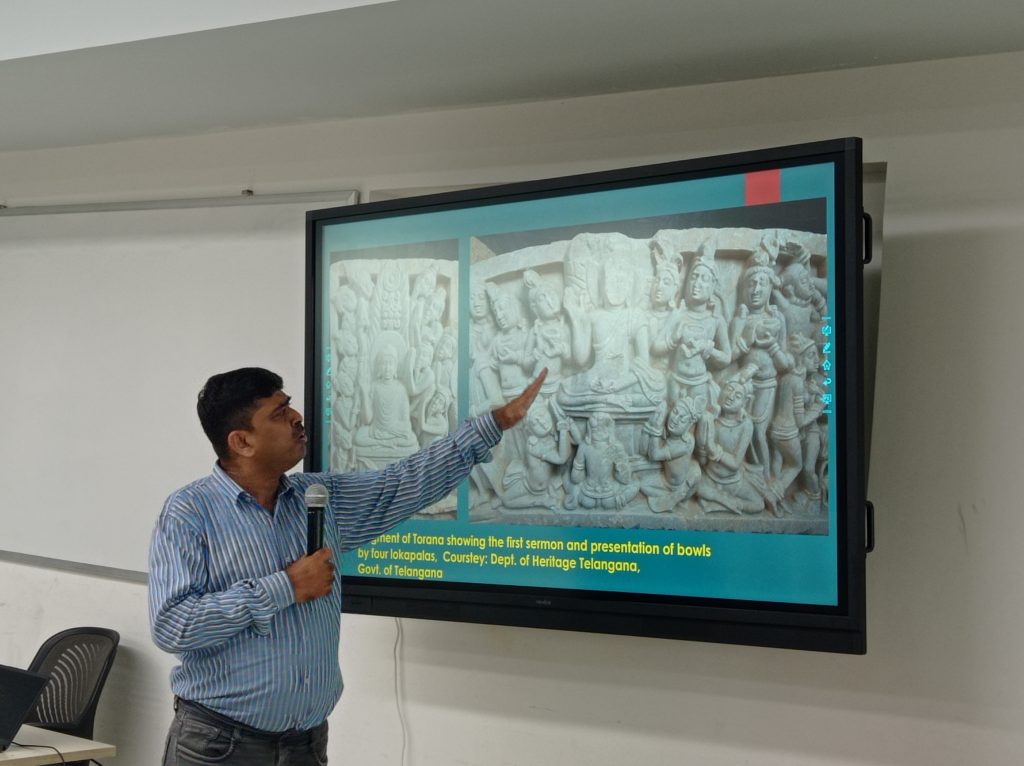
Dr Shrikant Ganvir, Assistant Professor in Ancient Indian History, Culture, and Archaeology from Deccan College Post Graduate Research Institute, Pune, delivered an invigorating session organised by the Department of History at SRM University-AP on October 11, 2023. Dr Ganvir’s session dealt with Buddhist studies, particularly of the Andhra region, and he has extensively worked on sites like Phanigiri, Salihundam, Amaravati, Guntapalli, and likewise.
Dr. Ganvir specialises in Buddhist art, architecture, and iconography. His area of expertise includes the religious history of Deccan, the history of Buddhism in South Asia, the rock-cut architecture of the Deccan, the religious imagery of ancient India, and the archaeology of religions. His broad knowledge in these fields allowed him to share enlightening insights with his audience.
- Published in Departmental News, History Current Happenings, History News, News
Dr Malavika Binny to illuminate on the Life and Legacy of Swami Vivekananda
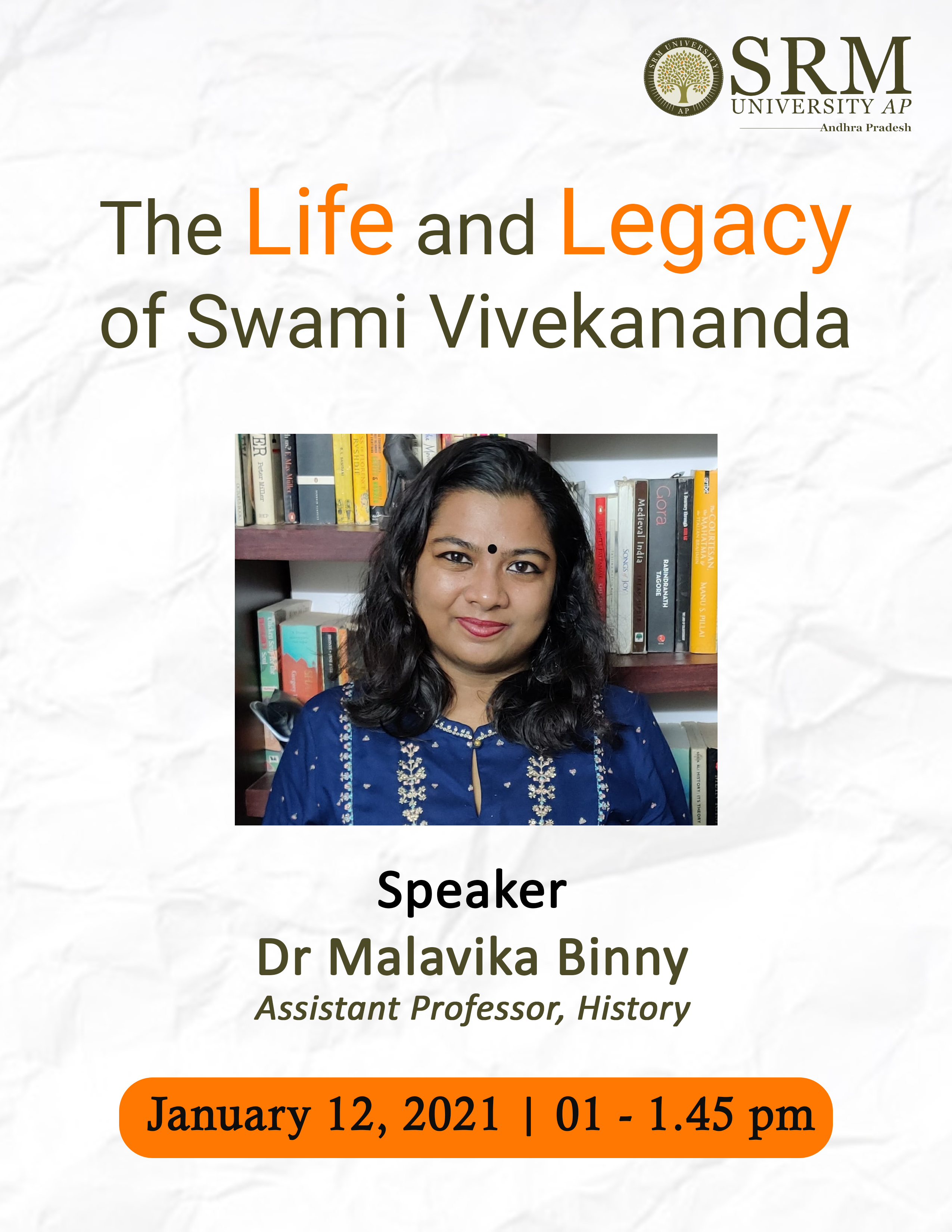
Dr Malavika Binny, Assistant Professor, Department of History, SRM University-AP, Andhra Pradesh will be presenting a webinar on the Life and Legacy of Swami Vivekananda to memorialize the legend on his birth anniversary. Swami Vivekananda worked relentlessly to propagate the ideas of pure life across the globe. His unparalleled greatness surpasses and excels all worldly achievements. He has left us with a rich spiritual legacy pertaining to Hinduism, and salvation of the soul. On January 12, 2021, at 1 PM, Dr Malavika will be providing a depiction of Swami Vivekananda’s life and teachings for the benefit of the audience.
- Published in Events, History Current Happenings, History Events
“Films as History; Exploring Historiophoty”-a discussion on defining the relations between Films and History.
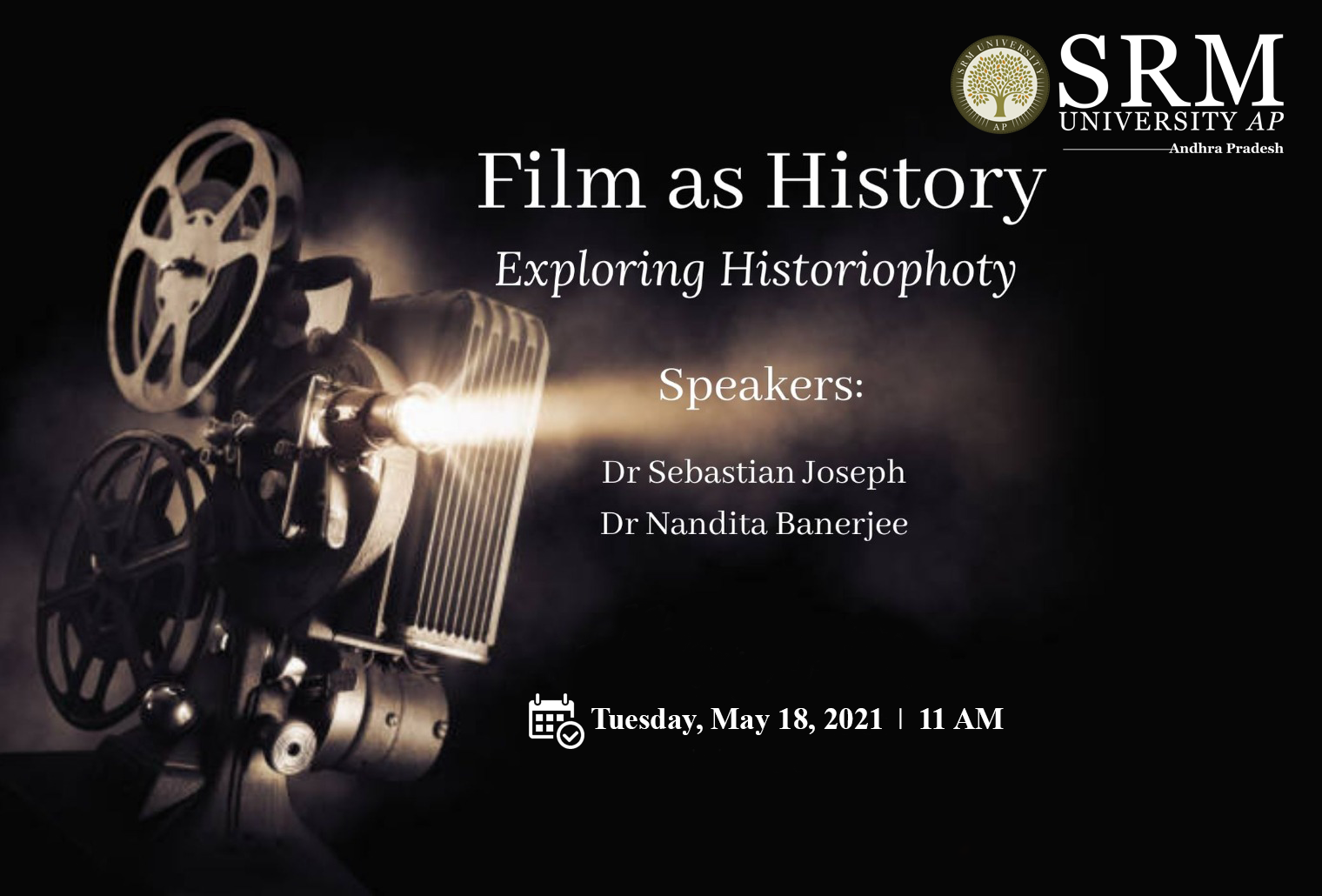 The Department of History, SRM University-AP, initiates a monthly webinar series with a thought-provoking discussion on defining the relations between Films and History. “Films as History; Exploring Historiophoty”, the introductory session of the series, has been scheduled for Tuesday, May 18, 2021, at 11 am.
The Department of History, SRM University-AP, initiates a monthly webinar series with a thought-provoking discussion on defining the relations between Films and History. “Films as History; Exploring Historiophoty”, the introductory session of the series, has been scheduled for Tuesday, May 18, 2021, at 11 am.
Dr Sebastian Joseph, a Historian and Film Critic, will deliver the first talk of the webinar. Dr Joseph was the State Award Winner for Best work on Film History 2020. He has authored Cochin Forests and the British Techno-ecological Imperialism in India.
Dr Nandita Banerjee will be the keynote speaker in the second session of the webinar. She is an Associate Professor at Sindhu Kanho Birsa University and a pioneer in Film History and Visual Studies in History.
The webinar aims to discuss the use of films in particular and visual images in general as sources for the reconstruction of History. It will deal with the promises and challenges of Historiophoty as a sub-stream of history. Following Hayden White’s pathbreaking analysis of visual imagery and its location in historiography, Historiophoty has emerged as a most promising pathway for historians, particularly as we move towards a rapidly digitizing world. The webinar series will introduce students to new and exploratory themes in History.
Join the Webinar Here: https://srmap.zoom.us/j/96304703524?pwd=VVRBY3VLRDdsbEVGTDBBdnY0T2RrQT09
Meeting ID: 963 0470 3524
Passcode: 803909
- Published in Events, History Current Happenings, History Events, Webinars
- 1
- 2


